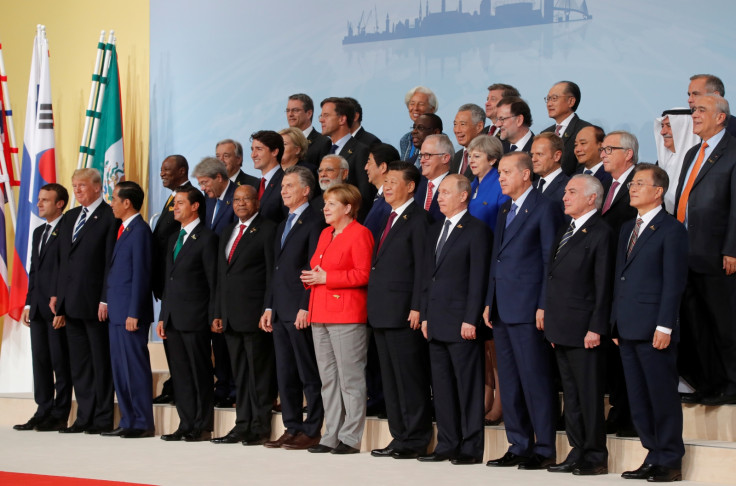Trump left isolated as G20 summit wraps with commitment to fight global warming
The meeting's final statement calls deal to reduce greenhouse gases "irreversible" and vowed to implement it quickly.
World powers lined up against U.S. President Donald Trump on climate change Saturday, reaffirming their support for international efforts to fight global warming.
The final statement of the Group of 20 summit in Hamburg, Germany, underlined that the other countries and the European Union supported the Paris climate agreement rejected by Trump. They called the deal to reduce greenhouse gases "irreversible" and vowed to implement it quickly and without exception.
The other countries, from European powers such as Germany to emerging ones such as China and energy producers such as Saudi Arabia, dismissively "took note" of the U.S. position, which was boxed off in a separate paragraph that the summit host, German Chancellor Angela Merkel, made clear applied only to the United States.
She said the U.S. position was "regrettable" but that the summit had achieved "good results in some areas," and cited a hard-won agreement on trade that does include Trump and the United States.
On trade, difficult talks yielded the preservation of the G-20's condemnation of protectionism, a statement that has been a hallmark of the group's efforts to combat the global financial crisis and the aftereffects of the Great Recession.
The group added new elements, however: an acknowledgment that trade must be "reciprocal and mutually advantageous" and that countries could use "legitimate trade defense instruments" if they are being taken advantage of.
That echoes concerns raised by Trump, who was attending his first G-20. He has said trade must be fair as well as open and must benefit American companies and workers. He has focused on trade relationships where other countries run large surpluses with the U.S., meaning they sell more to U.S. consumers than they buy from American companies.
More broadly, concerns about trade and its impact on workers figured large in the 2016 U.S. presidential election and in Britain's referendum vote to leave the European Union, a free-trade bloc.

Yet pro-trade officials from the European Union pointed out that the language in the G-20 statement contains no departure from the current global system of regulation, which already allows countries to take defensive measures within the rules of the World Trade Organization. Those can include import taxes that offset unfair practices such as government subsidies or below-cost pricing.
The EU demonstrated its willingness to move ahead with free trade despite Trump by announcing a trade agreement with Japan on the eve of the summit.
On climate, summit deputies hashed out a three-part fudge that everyone could sign. That meant a first section with a broad pledge to fight climate change in general; a separate paragraph carved out that acknowledged the U.S. did not support the Paris deal; and a third paragraph in which the other 19 members reaffirmed their support for the deal.
The results of the summit aren't absolutely decisive, on either the trade or the climate issue. The no-protection pledge was often violated, increasingly in harder-to-detect ways such as tax breaks for home industries rather than obvious import taxes. Meanwhile, failure to agree on climate doesn't stop countries from moving ahead in meeting the Paris agreement's goals, or exceed them if they want to. Additionally, U.S. states and private companies can pursue lower emissions on their own.
G-20 agreements are statements of intent and rely on governments themselves to follow through. Still, they set the tone for global policymaking and enable peer pressure when they're not followed.
Other deals at the summit included an agreement to press internet providers to detect and remove extremist content as a way of fighting terrorist incitement and recruiting.
John Kirton, co-director of the G-20 Research Group at the University of Toronto's Munk School of Global Affairs, called the summit a "very solid success," pointing to broad agreement on the agenda, much of it focusing on less controversial issues. He said that over the long term the G-20 implements 70 percent of its promises, and has implemented 80 percent of them since last year's summit in Hangzhou, China.
The meetings competed for attention with rioting by anti-capitalist demonstrators outside the heavily secured Hamburg Messe convention center. Rioters set up street barricades, looted supermarkets and attacked police with slingshots and firebombs.
The G-20 comprises Argentina, Australia, Brazil, China, Germany, France, Britain, India, Indonesia, Italy, Japan, Canada, South Korea, Mexico, Russia, Saudi Arabia, South Africa, Turkey, the U.S. and the European Union.
© Copyright IBTimes 2024. All rights reserved.






